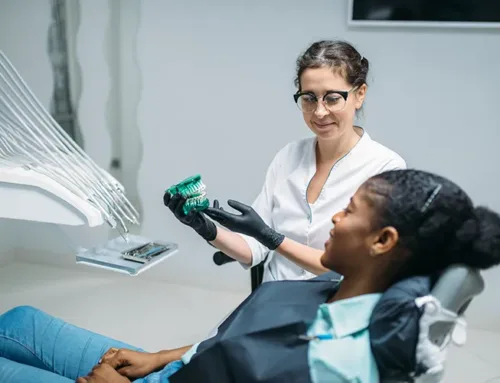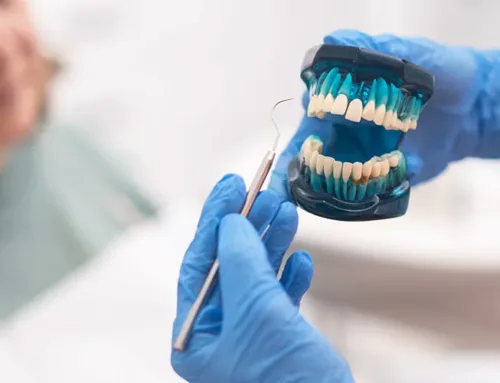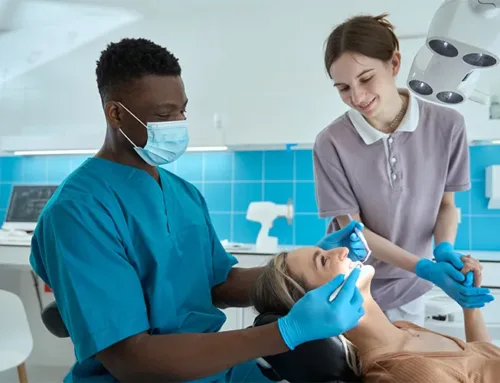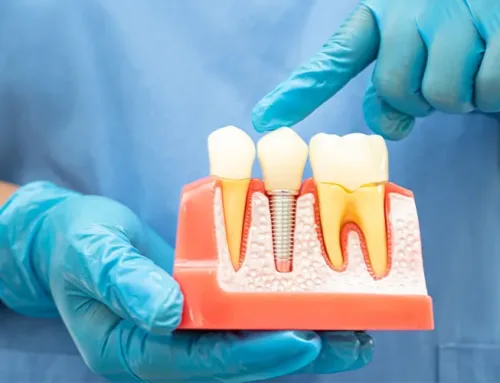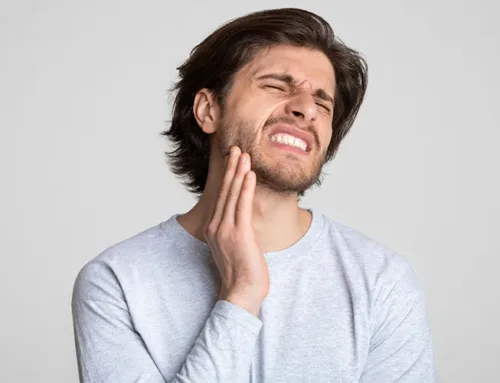To Rinse or Not to Rinse? The Truth Behind Water, Toothpaste, and A Sparkling Smile
August 17, 2023
Rinsing with water after brushing your teeth seems like a natural part of the daily oral hygiene routine; after all, most don’t enjoy the residual taste of toothpaste after brushing. However, this seemingly innocuous practice has stirred up quite a debate among dental health professionals, leaving a lot of us wondering if we should be rinsing with water at all. Let’s delve into the role of toothpaste and fluoride in oral care, what the pros and cons are of water rinsing, and what the opinions are of leading dental organizations. Plus, we’ll give you some alternative options and adjustments you can make to your routine if you choose to not rinse with water. So, to rinse or not to rinse? Read on to find out which choice is the right one for you and your oral care routine.

The Purpose of Toothpaste & The Role of Fluoride in Your Oral Care Routine
A good place to begin in understanding the debate surrounding rinsing with water is with the purpose of your toothpaste, and what the functions are of the main ingredients in it. Your toothpaste serves to clean and protect your teeth by removing plaque and bacteria, which helps prevent tooth decay and gum disease. To get the job done, your toothpaste contains ingredients like fluoride, abrasives, detergents, humectants, and flavorings. What are these?
Out of these main ingredients, fluoride is key as it plays a crucial role in maintaining the health of your teeth. It helps prevent tooth decay by remineralizing tooth enamel (outer protective layer) so that your teeth are more resistant to acid attacks. An acid attack can occur when bacteria produces acid as a byproduct of breaking down leftover food particles, or when you eat or drink anything acidic. When the acid hits your tooth enamel, the enamel becomes softer for some time and loses some of its mineral content, which can lead to small holes in your teeth (cavities). This is counteracted by your saliva, which slowly neutralizes the acid and the remineralization power of fluoride, which is primarily found in toothpaste and mouthwash rinses.
What Happens to Fluoride If You Rinse With Water After Brushing?
When fluoride is applied directly to your teeth, whether that’s through your toothpaste or at the dentist’s office through a gel, it needs several minutes to work. If you rinse with water immediately after brushing with a fluoride-based toothpaste, you may inadvertently wash away the fluoride before it has had a chance to work optimally on your teeth. The same applies to using mouthwash after brushing with fluoride toothpaste; you may wash it away. To maximize the benefits of fluoride, it is recommended to use mouthwash at a separate time from brushing.
What Are The Pros and Cons of Rinsing With Water?
There are several reasons why some people choose to rinse with water, which include:
1. You Remove Bacteria & Food Particles: Rinsing with water can help to wash away any remaining food particles that may have been loosened during brushing and flossing, leaving the mouth feeling clean and refreshed.
2. You Prevent Overexposure to Fluoride: While fluoride is beneficial for dental health, excessive exposure can lead to a condition called dental fluorosis, which causes white spots on the teeth. Rinsing with water can help to remove excess fluoride from the mouth.
3. You Neutralize Acid After Eating/Drinking: if you know you are consuming acidic foods and beverages that can weaken your tooth enamel over time, then rinsing with water can help neutralize this acid and reduce the risk of enamel erosion. However, this is only done after immediately consuming food and beverage items and doesn’t require you to brush beforehand.
On the other hand, there are reasons why some people argue against rinsing with water after brushing. These include:
1. Reduced Effectiveness of Fluoride: Rinsing with water can wash away the fluoride in toothpaste, reducing its ability to protect the teeth. By not rinsing, the fluoride is given more time to be absorbed by the teeth and provides maximum protection.
2. You Dilute Toothpaste Mid-Brush: If you choose to rinse with water mid-brush, this is going to dilute your toothpaste, making it less effective at cleaning and protecting the teeth.
3. You Decrease Likelihood of Cavity Prevention: Not rinsing with water can help maintain fluoride levels on your teeth, which may help decrease the likelihood of developing cavities.
4. Increased Sensitivity: For people with sensitive teeth, rinsing with water can cause discomfort, as the cold or hot temperature will exacerbate the sensitivity; especially if you’re not using a sensitivity-based toothpaste.
Expert Opinions: Should You Rinse After Brushing Teeth?
It’s typically recommended that you do not rinse with water after brushing, especially if you are prone to tooth decay, as you want to give the fluoride enough time to do its work and help you rebuild your enamel. If you’re still a little iffy on what the right answer is; it comes down to your personal preference and the state that your oral health is in. However, here is what the Oral Health Foundation and the American Dental Association (ADA) have to say on the matter:
If you are unsure of whether you should stop rinsing with water after brushing, we highly recommend booking in with one of our dental professionals to get a complete overview and summary of what your dental health looks like. We can do a comprehensive examination of your teeth, gums, and mouth tissue, and ask you about your eating and drinking habits, which allows us to provide you with a pinpointed answer.
How To Adjust Your Oral Hygiene Routine to Omit Rinsing?
There are a few adjustments you can make to your oral hygiene routine to omit the need for rinsing with water after brushing.
1. For instance, consider flossing before brushing to remove plaque buildup and food particles that are lodged around the gum line and between the teeth. Once you’re done flossing, then give your mouth a good rinse before proceeding to brush.
2. Beyond this, use your mouthwash at a completely separate time than when you brush your teeth, as this will help you get the most benefit from the fluoride in your toothpaste, and the fluoride in your mouthwash.
3. Additionally, avoid eating or drinking anything for at least 30 minutes after brushing (60 minutes is better) to allow the fluoride to strengthen your enamel.
4. Consider purchasing a tongue scraper to help remove bacteria and debris from the tongue before brushing your teeth. This will help make the mouth feel fresher and cleaner, and may allow you to resist the urge to rinse with water after brushing.
5. If you enjoy gum, consider chewing sugar-free gum after brushing. This can help stimulate saliva production, get rid of that residual toothpaste, and still allow the fluoride to do its job. You can also add this in as a way to neutralize acid and wash away debris in the mouth after eating.
By following these simple steps, you can improve your oral health and reduce the need for rinsing with water after brushing. If you have questions about whether rinsing would be good or bad for your unique oral hygiene needs, contact Tampa Palms Dentistry for an in-depth recommendation.




